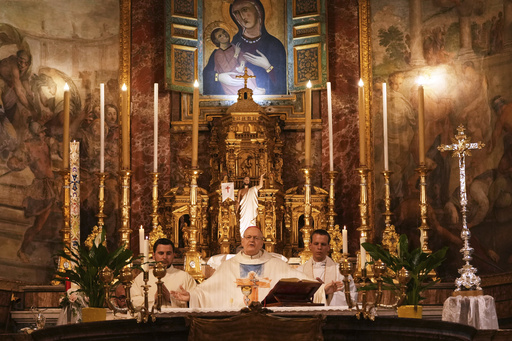VATICAN CITY — In preparation for the selection of a new pontiff, support personnel such as cleaners, cooks, doctors, nurses, drivers, and elevator operators have officially committed to confidentiality through an oath taken on Monday. This pledge of secrecy is fundamental as they support the cardinals during the conclave beginning on Wednesday to elect Pope Francis’ successor.
The penalty for breaching this confidentiality? Immediate excommunication. Around 100 individuals part of the conclave’s support team, including clergy involved in roles like confessors speaking multiple languages, made their vows in the Pauline Chapel at the Vatican. Vatican representative Matteo Bruni relayed this information, announcing that the cardinals will similarly affirm their secrecy in the Sistine Chapel on Wednesday prior to voting.
A wide variety of duties are performed by laymen and laywomen, such as accommodating and providing meals for the cardinals during the conclave, which concludes only when white smoke billows from the Sistine Chapel’s chimney, signifying a decision has been reached. The team will remain on-call throughout the conclave for any medical needs, ensuring the process unfolds with the dignity appropriate to electing the leader of the global Catholic community, numbering about 1.4 billion members. Of the 133 cardinals expected to cast ballots, 108 were appointed by Pope Francis.
These cardinals will reside within the Vatican, commuting to the Sistine Chapel either via foot or a special bus exclusive to their needs within the secured Vatican premises—highlighting the necessity for drivers to serve during this period.
In terms of technology and privacy, it was initially communicated by Bruni that cardinals would be required to leave their mobile devices at Santa Marta, where they are residing, but these wouldn’t be seized permanently. However, it was later clarified during an evening briefing that cardinals will indeed surrender their devices upon arrival and retrieve them only post-conclave. Bruni emphasized that beyond the logistical aspects, the conclave is a period entwined with prayer, reflection, and consideration of who might be divinely appointed as the new pope of Rome.
To ensure security, the Vatican will utilize signal jamming around the Sistine Chapel and the residences to prevent external communication or eavesdropping, with vigilant oversight by the Vatican gendarmes.
According to Vatican law, the oath-taking process is strictly regulated. St. John Paul II rewrote these regulations in a 1996 papal election document, primarily still current, although Pope Benedict XVI revised it twice before stepping down in 2013. These revisions intensified the secrecy aspect, reinforcing that any breach incurs automatic excommunication from the Church’s highest levels. While the possibility always existed under John Paul’s mandates, Benedict brought it to the forefront.
Currently, those vowing secrecy declare their promise and obligation to “observe absolute and perpetual secrecy with all who are not part of the College of Cardinal electors concerning all matters directly or indirectly related to the ballots cast.” Equally, they vow not to employ audio or video equipment during the election process within Vatican City. Any infractions result in automatic excommunication, a vow taken solemnly while physically touching the Holy Gospels.
As the conclave preparation culminates, the Vatican’s commission for child protection implored cardinals on Monday to address clergy sexual abuse decisively. They stressed that the Catholic Church’s credibility hinges on accountability, transparency, and justice for those harmed. Created by Pope Francis, the Pontifical Commission for the Protection of Minors issued a prayerful appeal to the cardinals engaging in pre-conclave discussions.
“Let no concern for scandal obscure the urgency of truth,” the statement read, addressing the deeply damaging effects of abuse across the church’s hierarchy globally. Whereas Pope Francis and his predecessor Pope Benedict XVI have made strides towards dealing with abuse, a veil of impunity persists, with calls for transparency and uninvasive processes for victims still unmet.
The commission’s leader, Cardinal Sean O’Malley, involved in pre-conclave dialogues, will abstain from voting due to his age—exceeding the 80-year threshold.



